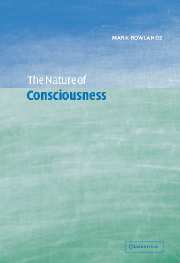Book contents
- Frontmatter
- Contents
- Preface
- 1 The problem of phenomenal consciousness
- 2 Consciousness and supervenience
- 3 The explanatory gap
- 4 Consciousness and higher-order experience
- 5 Consciousness and higher-order thoughts
- 6 The structure of consciousness
- 7 What it is like
- 8 Against objectualism II: mistakes about the way things seem
- 9 Consciousness and representation
- 10 Consciousness and the natural order
- Bibliography
- Index
7 - What it is like
Published online by Cambridge University Press: 22 September 2009
- Frontmatter
- Contents
- Preface
- 1 The problem of phenomenal consciousness
- 2 Consciousness and supervenience
- 3 The explanatory gap
- 4 Consciousness and higher-order experience
- 5 Consciousness and higher-order thoughts
- 6 The structure of consciousness
- 7 What it is like
- 8 Against objectualism II: mistakes about the way things seem
- 9 Consciousness and representation
- 10 Consciousness and the natural order
- Bibliography
- Index
Summary
The previous chapter distinguished two distinct conceptions of consciousness. According to the objectualist conception, consciousness is assimilated to an object of conscious experience; consciousness is an object towards which conscious experience can be directed. According to the actualist conception, on the other hand, consciousness is assimilated to an act of conscious experience. Consciousness, here, is not an object towards which conscious experience is directed; it is the directing itself of that experience. There is nothing illegitimate about either of these conceptions; consciousness has precisely the sort of dual structure that enables it to be both subject and object of conscious experience.
The dual structure of consciousness, the fact that it admits of both actualist and objectualist interpretations, however, carries over and infects the concept of the what it is like of conscious experience, which many take to be constitutive of conscious experience as such. Since the concept of consciousness admits of both actualist and objectualist interpretations so too does the what it is like of conscious experience. According to the objectualist interpretation of this latter concept, what it is like is an object of conscious acquaintance. When one undergoes an experience that is defined by a phenomenology, then one of the things with which one is consciously acquainted, one of the things of which one is consciously aware, is the what it is like to have that experience.
- Type
- Chapter
- Information
- The Nature of Consciousness , pp. 148 - 177Publisher: Cambridge University PressPrint publication year: 2001



